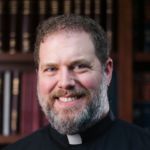
Between the sixth century and the mid-twentieth century, the Latin Church’s daily prayers included, at the office of Prime, a creed that has become almost unknown to many Catholic Christians. More’s the pity, for this creed, sometimes called the (pseudo-)Athanasian Creed or the Quicunque vult, from its Latin incipit, long provided a concise summary of the Church’s trinitarian dogma.
Each line here is intentional and relates to some form of potential heresy. Say this, not that. And lest we see, as so many modern Christians, this kind of boundary-keeping as mere boundary-keeping, or mere theological pedantry, the mind of the Church has always thought this discipline in language matters because it concerns our creation and our salvation. The Trinity is the source of our life and the end of our life. To get it wrong is to get life wrong, to get salvation wrong.
Misunderstanding the Trinity is more than some theological spelling error or minor typo, for to misunderstand who God is is to misunderstand who we are and to misunderstand the nature of reality. Let me relay a portion of the Quicunque:
So the Father is God, the Son is God, and the Holy Spirit is God;
And yet they are not three Gods, but one God.
So likewise the Father is Lord, the Son Lord, and the Holy Spirit Lord;
And yet they are not three Lords but one Lord.
For like as we are compelled by the Christian verity to acknowledge every Person by himself to be God and Lord;
So are we forbidden by the catholic religion to say, There are three Gods or three Lords.
The Father is made of none, neither created nor begotten.
The Son is of the Father alone; not made nor created, but begotten.
The Holy Spirit is of the Father and of the Son; neither made, nor created, nor begotten, but proceeding.
So there is one Father, not three Fathers; one Son, not three Sons; one Holy Spirit, not three Holy Spirits.
And in this Trinity none is afore or after another; none is greater or less than another.
But the whole three persons are coeternal, and coequal.
So that in all things, as aforesaid, the Unity in Trinity and the Trinity in Unity is to be worshiped.
If I can put it bluntly, a wider familiarity with this creed would probably prevent any number of unintentional cases of material heresy, like the idea that the Trinity is something like the three forms of water, or three personae in an evolving drama, or just three names for the same basic thing, or just three functions of the divine nature like creation, redemption, and sanctification. The three persons are not parts of God. You do not add them up to form one God. Nor are they simply different masks for some fourth thing lurking behind. What God does, all three persons do. What God is, all three persons are. Yet they are, and they do, in three unique ways. Ultimately, the Church’s theologians came to understand that the only “properties” of the three persons—that is what makes them distinct from one another—are relations. The Father is unbegotten. The Son is begotten. The Spirit proceeds. These are their eternal relations, not moments in created history.
I suspect that a lot of preachers today will be trying to explain this in a way that makes sense or that helps people “get it.” I’m not going to do that. One, because all my books are packed up for a move, and practicality stands in the way of my desire to consult this or that author in the hope of reaching the perfect homiletical synthesis. Two, because I think this temptation is dangerous, in a way. We should, absolutely, want to understand the Trinity. Most Catholics probably do not spend enough time trying to understand the Trinity. But if we walk away from Trinity Sunday thinking, “Oh, I get it now!”, then we are about as far away from understanding as ever. For the purpose of the triune relationship is not to bring us into an infinitely curious speculative discourse, but to bring us into Love.
Countless pages have been written on this subject. We should read them, I think, rather than trying to condense them into something more manageable that is likely more heretical the more manageable it gets. But we should also remember that the purpose of all that theology is not merely to understand, but to understand the one we love.
That is certainly a theme from today’s readings, none of which, apart from that brief doxology called sometimes just “the grace” from 2 Corinthians, seems to invoke the Trinity explicitly. In John 3, Jesus reminds Nicodemus that the mission of the Son is to reveal the love of the Father for his world. In Exodus 34, after Israel has fallen headlong into sin at the foot of Mount Sinai—remember that time when Moses stayed a little bit too long in divine conference, and the people decided to erect a golden calf and name him their God?—Moses returns to beg the Lord’s mercy. They are, Moses acknowledges, a stiff-necked people, but, then, God is God: “The Lord, the Lord, a God merciful and gracious, slow to anger, and abounding in steadfast love and faithfulness” (Exod. 34:6). Our lectionary makes an unfortunate cut here, for this exposition of the Divine Name continues with what might seem less pleasant material: “Keeping steadfast love for thousands, forgiving iniquity and transgression and sin, but who will by no means clear the guilty, visiting the iniquity of the fathers upon the children and the children’s children, to the third and the fourth generation” (v. 7).
Don’t take this as some angry critique of the lectionary. Often there are good, reasonable reasons for making these cuts; after all, we cannot cover everything all at once. But I do see this as an opportunity to think about this particular piece of revelation and how it relates to the Trinity.
I think it would be a mistake to discount a kind of paradox here. How can God be at the same time “merciful and gracious, slow to anger” and “visiting the iniquity of the fathers upon the children and the children’s children”? What we have here is a set of contrasting extremes, and they show us less about the concrete reasons of why things happen in a particular way in history than about the absolute transcendence of the God of Israel and how our relationship with him is of paramount importance. This is not just some local deity who can be appeased by the occasional blood offering and then forgotten about. This is Lord God of Hosts, I AM, the Almighty, creator of heaven and earth, of all that is, visible and invisible. We want him on our side. Or rather, we want to be on his side, because in a certain way it is really the only side.
In the light of revelation, we confess that this God, Father, Son, and Holy Spirit, is himself a trinity of love in eternity. The whole of creation is as a speck, less than a speck—Julian of Norwich says it is like a hazelnut—in the hand of God. He has no need of us, for he is the source of all that is. He has no need of our love; he has no need to love us, for his own being is the perfection of love among eternal persons, giving, receiving, giving back. Yet, as Julian understood in her vision, despite how little this thing—all that exists—is, God made it, God loves it, and God keeps it. But, as she says, to know what this means is possible only when we are united with the one who made us, who knows us, who loves us, and who keeps us.
For this is the cause why we be not all in ease of herete and soule, for we sekyn here rest in those things that is so littil, wherin is no rest, and know not our God that is al mighty, al wise, all gode; for He is the very rest. God will be knowen, and Him liketh that we rest in Him (Shewings, Part 1, V).
We seek rest in things that are “so little,” but God wills to be known. Today Holy Church reminds us that our God is not little. Nor is he big simply in earthly terms. He is beyond our knowing—that is, until we are united with him fully through his own gift of himself in the Spirit, who unites us to the Son, who shows us the Father. As William of St. Thierry, the great Cistercian master of the twelfth century, reminds us, “love is itself knowledge.” The chief way—the only way—of apprehending the Trinity, is worship. “Blessed be the Holy Trinity, and the undivided Unity: we will praise and glorify him, because he hath showed his mercy upon us” (Introit for Trinity Sunday).



